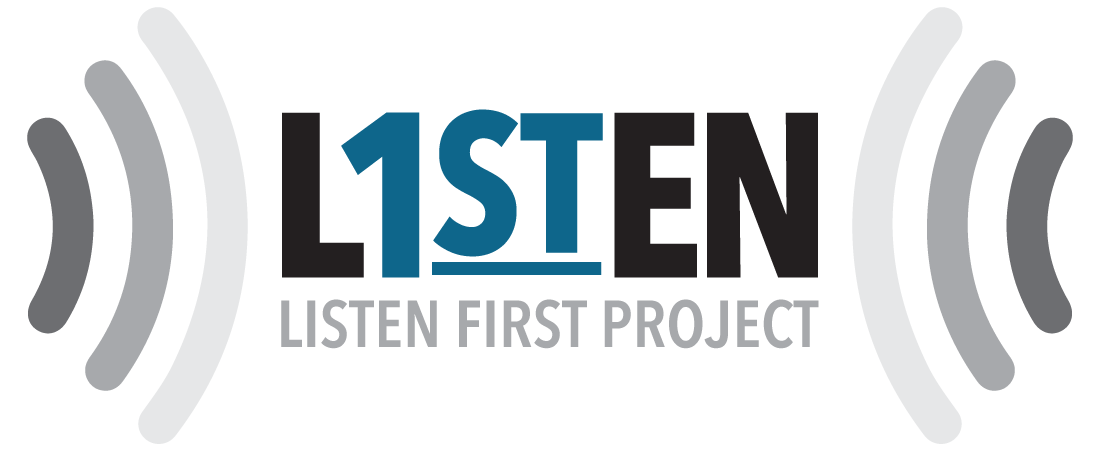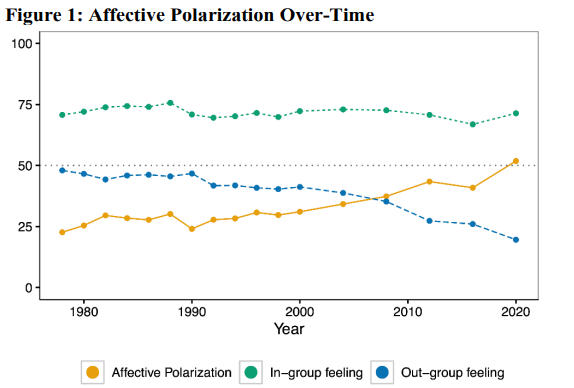Toxic Polarization: The Latest Numbers
National fear and personal pain
87% are tired of political division (Starts With Us)
87% say political polarization is a threat to America. (AP/NORC)
86% of Americans say that they feel exhausted by the division in America. (Hidden Tribes)
81% are concerned about “political divisions within the country.” (Fox News)
80% of partisans believe that the other party “poses a threat that if not stopped will destroy America as we know it." (NBC News)
77% of voters believe that Americans who strongly support the other side are “a clear and present danger” to America. (UVA Center for Politics)
45% of Americans think members of the opposing party are “downright evil.” (SNF Agora Institute)
72% of Republicans view Democrats as more immoral than other Americans, while 62% of Democrats say Republicans are more immoral than other Americans. (Pew)
For the past five decades, the American National Election Studies surveys have asked Democrats and Republicans to rate the opposing party on a “Feeling Thermometer” that ranges from zero (very cold/unfavorable) to 100 (very warm/favorable). In 2000, just 8 percent of partisans gave the other party a zero. By 2020, that figure had shot up to 40 percent. (Election Studies)
Nearly a third of college students who identify as Republican said they wouldn’t even go on a date with a Democrat, and more than two-thirds of Democratic students said the same of members of the GOP. (Axios)
80%, a record high, believe Americans are greatly divided on the most important values (Gallup)
62% of Americans believe “there is more that divides us than unites us.” (Frank Luntz)
70% say America has become so polarized that it can no longer solve the major issues facing the country — and that those differences will only continue to grow. By contrast, 27% agree with the statement that, despite the nation's strong partisan differences, the country always comes together to solve the greatest challenges. In 2010, when pollsters asked the same questions, only 45% of Americans felt we had become too divided to solve anything and 50% felt we could unify despite our differences. (NBC News)
53% say the political system is too divided to solve the nation’s problems. (New York Times)
66% of partisans see the opposing party as “a serious threat to the United States and its people.” (Kalmoe and Mason)
48% of Republicans placed their feelings about Democrats at 0 on a 100-point scale (76x the share who did so in 2000) and 39% of Democrats reported their feelings about Republicans as 0 (43x the share who did so in 2000). (Pew)
71% believe American democracy is now threatened. (CBS News)
67% perceive “a serious threat to our democracy." (Wintemute, et al.)
Voters identified “political polarization and division” as their second highest perceived threat to democracy—giving it a 7.3 on a 10-point scale. (Citizen Data)
61% of Americans say they are concerned that the U.S. could be on the verge of another Civil War. A majority of those who identify as Very Liberal or Very Conservatives are very concerned. (Engagious)
50% at least somewhat agree that “in the next few years, there will be civil war in the United States.” (Wintemute, et al.)
83% are concerned about political violence. (Navigator)
51% expect political violence to increase. (CBS News)
51% (including 55% of independents and 85% of Democrats) say the Republican Party has been taken over by racists. (PRRI)
44% (including 84% of Republicans and 47% of independents) say the Democratic Party has been taken over by socialists. (PRRI)
35% of partisans now believe that violence could be justified to advance their parties’ political goals (Politico); 43% agree that "our American way of life is disappearing so fast that we may have to use force to save it." (Wintemute, et al.); 21% believe political violence is at least sometimes justified “to advance an important political objective you support.” (Wintemute, et al.);
26% agree that “because things have gotten so far off track, true American patriots may have to resort to violence to save the country.” (Wintemute, et al.)
41% of Biden and 52% of Trump voters at least somewhat agree that it’s time to split the country, favoring blue/red states seceding from the union. (UVA Center for Politics)
66% see the opposing party as a serious threat to the U.S. (Lethal Mass Partisanship)
Republicans (57%) and Democrats (41%) now think of the other party as enemies rather than political opposition. (CBS News)
20% say many members of the other side “lack the traits to be considered fully human.” (Lethal Mass Partisanship)
In 1958, 33% of Democrats wanted their daughters to marry a Democrat, and 25% of Republicans wanted their daughters to marry a Republican. But by 2016, 60% of Democrats and 63% of Republicans felt that way. (New York Times)
49% of Republicans and 33% of Democrats say they would be “displeased” if their child married someone from the other political party. (Vox).
15% of Republicans and 20% of Democrats say the country would be better off if large numbers of opposing partisans “just died.” (Lethal Mass Partisanship)
54% say other Americans pose the biggest threat to our country. (CBS News)
66% say when discussing issues with those with whom they disagree, people are “quick to attack them.” Only 24% say people are “quick to listen.” (Listen First Project).
62% say the political climate prevents them from saying what they believe. (CATO)
47% have not publicly shared an opinion because they were afraid of being punished in some way. (Frank Luntz)
Americans rate “division in the country” as the most important issue facing them personally. (Georgetown University)
34% have stopped talking to someone permanently because of political disagreements. (Frank Luntz)
32% say division has made it difficult to get along with friends or family. (Ipsos)
19% have experienced depression, anxiety or sadness as a result of partisan disagreements and divisiveness. (Public Agenda)
Only about one-third of Americans believe that “most people can be trusted,” a sharp drop from nearly half of the population in the 1970s. (Pew)
One in five Americans has ended a relationship with a friend or family member due to political differences (American Psychiatric Association)
Two-thirds of us now actively avoid political conversations with coworkers, friends, or family (AMP Research)
We don’t know those we hate
77% have few or no (41%) friends from the other side. (Pew)
71% say they have avoided talking about politics with someone whose political views are opposed to their own in the last twelve months. (Ipsos)
60% now live in ‘landslide counties’ where the Democratic or Republican presidential candidate wins by 20+ points. (New York Times)
85% say those who voted for the other presidential candidate don’t understand people like them. (Pew)
70% feel a responsibility to connect with people whose backgrounds and viewpoints are different than their own - what we call “Collective Responsibility” (More in Common)
Desire and hope for change
“Divided” is the most commonly chosen word to describe America today, selected by a majority of Republicans, Democrats, and Independents. Conversely, when describing their ideal future for America, “united” is the top desired quality, again without variation across party lines. (More in Common)
88% of Americans agree that compromise is crucial for successful collaboration, and 75% say it’s important to compromise to get things done, compared to just 15% who believe it’s more important to fight for your values even if it means not finding a solution (Walton Family Foundation)
82% say our success as a nation depends on our ability to work together across differences. (More in Common)
79% say, given the opportunity, they would play a part in reducing social division in America. (Listen First Project)
88% say people need to be willing to work together with those holding different beliefs. (Walton Family Foundation)
80% say it’s important to listen to people with different opinions. (Walton Family Foundation)
72% believe we have a responsibility to connect with people who are different from us. (More in Common)
64% say they want to live in an America where each of us has plenty of connections to people whose backgrounds and viewpoints are different from our own. (More in Common)
57% say now more than ever, it is important to connect with people who’s backgrounds and viewpoints are different from our own. (More in Common)
76% believe it’s crucial for citizens to be involved in finding solutions to problems facing our communities and country. (Starts with Us)
Americans rank “uniting the country” as the most important national priority. (Making Caring Common Project)
93% of Americans say it is important to reduce divisiveness in the United States, including two-thirds who say it is very important to do so. (Public Agenda)
75% agree with the statement “It is still possible for the U.S. to achieve the ideal of our national motto ‘E Pluribus Unum’: ‘From many people, one.’” (PRRI)
86% believe it is possible for people to disagree in a healthy way. (Weber Shandwick)
72% believe Americans have more in common than what divides us. (Public Agenda)
71% believe there is more common ground among the American people than the news media and political leaders portray. (Public Agenda)
66% say the differences between Americans are not so big that we cannot come together. (More in Common)
67% believe we can overcome big challenges together if we try. (Walton Family Foundation)
66% agree with the statement, “In the end, we’re all Americans. I genuinely care about all Americans no matter their political views.” (Making Caring Common Project)
61% would be interested in talking across political differences if they “would be listened to respectfully.” (Making Caring Common Project)
79% say that creating more opportunities for people to talk and interact with those who have different values and views would be effective in reducing divisiveness and destructive disagreement. (Public Agenda)
58% of Americans believe that creating well-organized opportunities for people to get together and discuss ideas for addressing problems in their communities would help bring the country together. (Public Agenda)
80% say “Political leaders should compromise with the other party to get things done, even if they don’t like some parts of the compromise.” This view is shared by at least 75% of Republicans, Democrats, and Independents. Compared to only 18% who say “Political leaders should stick to their beliefs and avoid compromise, even if little gets done.” (Gallup)
80% agree that “everyone, regardless of their views, has the right to free, nonviolent expression.” (Gallup)
83% say “It is never OK for people to use violence to achieve a political goal.” (Gallup)
84% say “The U.S. is stronger as a nation because it has people from different races, religions and cultures.” This view is shared by at least 75% of Republicans, Democrats, and Independents. (Gallup)
Are we missing a data point? Email Pearce@ListenFirstProject.org


